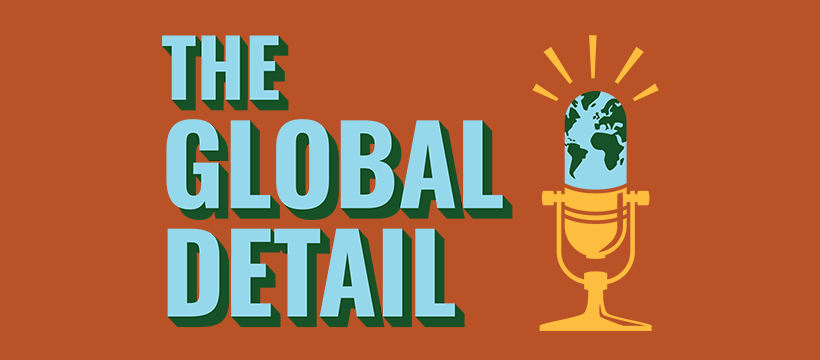Episodes
Season 1
What happens when you find your worst enemy is safely hidden in an ally country? Cameron Munter was the U.S. Ambassador to Pakistan when the United States found and killed Osama Bin Laden in Pakistan. Husain Haqqani was the Pakistani Ambassador to the United States. Both ambassadors tell their story as we examine the Rashomon Effect of this historic incident.
As a journalist and the ex-wife of the former Pakistani Prime Minister, Reham Khan has unique insight into the politics of charitable work and challenges one meets when trying to make change in a conservative Islamic society like Pakistan. We spoke to her during the height of the COVID 19 pandemic in India & Pakistan to get her views on the state of politics in the region. (NOTE: This interview was release one week prior to Imran Khan being removed from office.)
Few authors know the might of the pen over the sword like novelist and columnist Aatish Taseer, who has been both celebrated and censured for his work by individuals and governments. Born to an Indian Sikh mother and a Pakistani Muslim father, Aatish Taseer is a writer whose background gives him unique insight into the politics of the Subcontinent. Akshobh Giridharadas spoke with him during the height of the pandemic about politics and identity and how his personal journey influenced his career as a writer.
As the Ukraine defends itself from the ongoing Russian invasion, Christopher Miller, an Assistant Professor of International History at the Fletcher School of Law & Diplomacy at Tufts University, delves into the mindset of Vladimir Putin and the politics of Russia that created this conflict.
Within days of American withdrawal, Afghanistan fell under Taliban control with a speed that took much of the world by surprise. Akshobh Giridharadas spoke with Michael Kugelman Deputy Director and Senior Associate for South Asia at the Wilson Center, to get his assessment of how it happened and of life in Afghanistan in the era of Taliban 2.0.
In the wake of wars, climate change, and scarce resources, Sir Mark Lowcock, a former U.N. Under-Secretary-General for Humanitarian Affairs and Emergency Relief Coordinator, talks about the strategies and systems needed to combat a potential food crisis around the globe.
Amanda Glassman & Julia Kaufman from the Center for Global Development talk about evaluating the effectiveness of aid & intervention programs in the area known as the Global South.
Wajahat S. Khan talks to Aksobh Girdharadas about Pakistan, the legacy Partition, the perils of the military state and the tumultuous history of India and Pakistan, as these neighboring nuclear powers celebrate 75 years of independence.
With the United States more divided than any time since its Civil War, The People’s Republic of China slowly but surely rises to take its place alongside the U.S. as a global superpower. Ali Wyne, a senior analyst with Eurasia Group’s Global Macro practice, discusses the challenges and opportunities that come with China emerging as a major player on the world stage.
Dr. Unni Karunakara, former President of Médecins Sans Frontières (a.k.a. Doctors Without Borders) led an organization that literally and metaphorically traverses borders. With altruism at its core, MSF prioritizes healthcare in the most impoverished and destitute places, to all people regardless of race, creed, religion or political affiliation. The challenges include political unrest, conflict zones and climate change and yet Dr. Unni explains how MSF remains unwavering in their commitment and their ethos.
Ambassador Ian Kemish unpacks the evolution of Australian diplomacy and how they have taken their place on the world stage while forging a new identity apart from their British colonial roots.
The American South has always occupied a thorny place in U.S. History. Chuck Reece is a Georgia native and former New York journalist who the founded both The Bitter Southerner and Salvation South, two sites dedicated to exploring the beauty of “The South” while also confronting its troubling history.
Reece helps us to unpack the vexxing subject of politics in The American South and how he uses the love of Southern culture to inspire change in the region using the recent changes in the state of Georgia as an example.
Milan Vaishnav talks about the different aspect of the Indian diaspora in America. Milan is a Senior Fellow and Director of the South Asia Program and the host of the Grand Tamasha podcast at Carnegie Endowment for International Peace.
Sugith Varughese is an Indian Canadian actor, writer, and director best known for his performance as Mr. Metha on the hit show Kim’s Convenience. He discusses working in film & television in Canada and the various aspects of diversity and representation in the entertainment business.
Season 2
Aaron David Miller from the Carnegie Endowment from International Peace discusses the current state of the Israel, from Judicial Reforms, the relations with the Palestinians, and Israel's dealing with the rest of the Middle East.
Lieutenant General Deependra Singh Hooda discusses his time in the Indian Army, including the famous 2016 "surgical strikes," along with the current and future state of India's foreign policy.
We talk to the authors of "Age of Danger: Keeping America Safe in an Era of New Superpowers, New Weapons, and New Threats" (Andrew Hoehn & Thom Shanker) about the myriad of new threats facing the United States and how to face them.
Omar Waraich, is a writer, journalist, and human rights advocate who has covered Pakistan and South Asia for Time Magazine and The Independent. He joins us to discuss the many issues facing Pakistan, from its political troubles to financial issues to its struggle against climate change.
Jay Naidoo is an Indian born South African social activist. He is the founding General Secretary of the Congress of South African Trade Unions, and was a Minister who served in President Mandela’s Cabinet. Naidoo gives his take on the state of the country, its economic prospects, and the future of Mandela’s African National Congress.




















